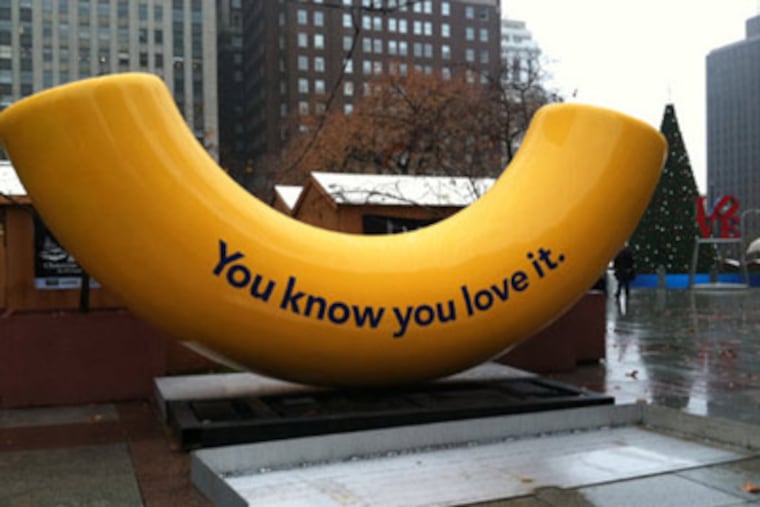'War on Christmas' continues across region and nation
It's beginning to look a lot like Christmas. Everywhere you go, people are bludgeoning one another with verbal stockings full of coal.

It's beginning to look a lot like Christmas. Everywhere you go, people are bludgeoning one another with verbal stockings full of coal.
Yes, the War on Christmas is back, complete with comedy from Jon Stewart, outrage from Fox commentator Bill O'Reilly, and complaints from believers and atheists alike.
In Pitman, a national group has criticized a "Keep Christ in Christmas" banner over a street. In Western Pennsylvania, a mayor has barred the same group's "there are no gods" banner from his town's Nativity scene. In Rhode Island, protesters singing "O Christmas Tree" interrupted a children's choir at the state tree-lighting ceremony because Gov. Lincoln Chafee had insisted on calling it a "holiday tree."
And let us not forget yesteryear in Philadelphia. In 2010, organizers of the city's Christmas Village, responding to complaints about exclusion (there was the tale of the little Jewish girl who said, "Dad, don't we get a village?"), dimmed the lights on the word Christmas in their sign. The national uproar was so loud, Mayor Nutter had to announce that the city was calling it Christmas again.
For Philadelphia Managing Director Richard Negrin, who handled most of last year's criticism, the episode provoked personal growth.
He says now, "If I say 'my heart grew three times that day,' can that be my quote?"
This year, tradition reigns anew. The collection of kiosks selling gifts, now in LOVE Park, is again called Christmas Village.
The city also stood strong against grinchy grumblings about crass commercialism. Visitors to Christmas Village can have their pictures taken with a one-ton noodle whose dimensions are roughly those of a small elephant - courtesy of Kraft. The food company paid Philadelphia $24,000 for the privilege. 'Tis the season of mac 'n' cheese!
Nationally, the Chafee incident prompted The Daily Show's Stewart to "make the hardest decision that any anchor of a fake news program has to make." He declared an actual War on Christmas - causing Fox's O'Reilly to say, "There is no question that Mr. Stewart is going to hell." He appeared to be joking.
Why does talk of war so often dominate a season that's supposed to promote good will? On one level, it's a debate about word usage. To some, holiday tree is about as clunky and meaningless as "woody perennial of the pine variety used as winter decoration."
Phil Vischer, author of Veggie Tales, the animated religious stories for children, argues: "What holiday does a 'holiday tree' celebrate - Arbor Day? Groundhog Day? Independence Day? Martin Luther King Day? There is no holiday called 'Holiday.' "
The War on Christmas also speaks to diverging cultural values: Where is the line between church and state? How does society balance the rights of minorities against those of the majority?
Stephen Nissenbaum, emeritus professor of history at the University of Massachusetts and author of The Battle for Christmas, says "War on Christmas" entered the political lexicon during the 2004 reelection campaign of President George W. Bush. Nissenbaum sees the controversy as the latest way Republicans have tried to rally conservative voters.
"I'm not saying anything very original here, but this is just the politicization of the culture wars, and on the one hand, probably a lot of disquiet on the part of a lot of largely white Christian Americans about everything that is happening to the country," Nissenbaum said in an interview.
For some, the War on Christmas is linked to issues such as abortion, he said.
But it's also true, as the title of his book implies, that in some ways Christmas has always been a war zone.
Puritans, upset at bawdy celebrations of a holiday with little basis in the Bible, tried to ban Christmas.
Our Founding Fathers?
"They didn't celebrate Christmas in any way that we would think of as a Christmas celebration," Nissenbaum said. "When Congress went on vacation for Christmas, it was only because people wanted to spend the whole season partying. It was sort of like New Year's Eve, but for a week or two."
Gradually, drunken mobs overtook the holidays, going to the homes of the wealthy to demand alcohol and money. (Yes, the Mummers are descendants of that early holiday tradition.) In early 1800s New York, those mobs erupted in riots, leading that city to establish its first professional police force.
At this point, Nissenbaum believes - and he acknowledges he is speculating a bit - New York's elites banded together to refocus the holiday on hearth and home. Clement Moore, a wealthy landowner, wrote "A Visit From St. Nicholas," better known as "The Night Before Christmas," to spread the idea that Christmas should be a family celebration.
Children, instead of the poor, became the main recipients of giving, Nissenbaum said.
Mobs, of course, remain a part of the Christmas tradition. In the modern era, they march on Wal-Mart, armed with pepper spray instead of alcohol.
See you at the noodle!